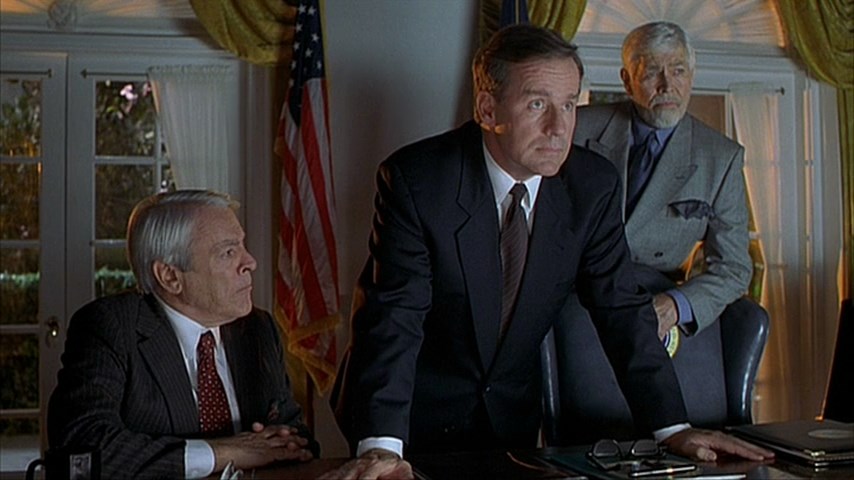
Joe Dante’s political satire The Second Civil War (1997), made for HBO, has become more relevant in the 2020s than it ever was in the waning days of the Clinton administration. The closed borders, the “make America great again” rhetoric, and the thinly veiled fascism of the government in The Second Civil War have all become symptomatic of Trump’s America and its toxic legacy. From the vantage point of the late nineties the idea of a governor closing Idaho’s borders and denying refuge to a plane full of Pakistani orphans sparking a series of state secessions was absolutely absurd.
Like executive producer Barry Levinson’s own film Wag The Dog (1997), The Second Civil War sets out to satirize the hypocrisy of liberal politics’ inherent systemic racism and classism while totally demonizing the right-wing, all in a series of, presumably, far fetched scenarios and developments. The framing device for The Second Civil War is “News Network” which allows the political narrative to play out with ongoing commentaries from different news crews that act as a kind of idealized liberal conscience. Dante always excels at telling stories via self-reflexive media but he cannot escape the Baby Boomer nostalgia for the political activism of the sixties that dogs the script.
But that Boomer nostalgia is infrequent and to an extent Dante is able to undermine it with some visual intertextuality that mirrors Denis Leary’s character’s misguided admiration for the “Duke” (John Wayne) as a political force. As a whole The Second Civil War, even when it flirts with the politically incorrect, never strays from reflecting the truth regarding the moral and philosophical corruption of American government institutions. Beau Bridges’ governor intent on closing his state’s borders is responsible for articulating the fundamental contradictions between individual desire and political responsibility. Elizabeth Peña’s reporter, who has had an affair with Bridges, is likewise torn between her left leaning political beliefs and her love for a conservative. The conflict between Elizabeth Peña’s and Beau Bridges’ characters (between the public and private spheres as well as the right and the left) are only the central conflict in a film of a dozen or so intersecting dichotomies.
Near the conclusion of the film, when Denis Leary and Dick Miller report on the mutiny of U.S. army soldiers against their superior officers, The Second Civil War transcends beyond all the trappings of satire and becomes a quasi-surrealist take on a post-Trump reality. As army officers are lined up and executed by firing squads a certain terrifying truth is, from the vantage point of 2022, conveyed. Audiences today are so accustomed to seeing footage of Americans (often police) killing other Americans (typically People of Color) in cold blood that Dante’s images hold none of their original impact. Suddenly The Second Civil War is overcome by our tragic national truth. None of Phil Hartman’s silliness or Dan Hedaya’s quips can pull The Second Civil War back into the realm of escapist entertainment.
James Earl Jones, a veteran reporter of the Civil Rights Movement, is the calm internal voice of America’s heart. He shows up intermittently, the only character with any voice-over, to dispense folksy wisdom and remind us what the American nation accomplished in the sixties. It’s a lot of tacky hokum that severely trivializes the historic reality of the sixties; essentially simplifying a decade of turmoil to the point that it is as easily digestible as the note in a fortune cookie. By the end of The Second Civil War this sermonizing, at the very least, feels ironic. However it is more than likely that James Earl Jones’ soliloquies will register as just plain nauseating.
For Joe Dante The Second Civil War is his most blatantly political film with The Burbs (1989), Gremlins 2: The New Batch (1990), and Small Soldiers (1998) far off in the distance. While none of these other politically minded comedies are as transparent as The Second Civil War, they all do share the filmmaker’s signature. In fact Denis Leary, Kevin Dunn and Phil Hartman would all go on to appear in Dante’s follow-up to The Second Civil War, Small Soldiers. Dante’s stable of regular actors (Dick Miller, Robert Picardo and Roger Corman) also appear in The Second Civil War. Dante’s passion for monster and disaster movies from the fifties is also on display in this film in how he sensationalizes events like the destruction of The Statue Of Liberty.
The real strength in Dante’s direction of The Second Civil War is one of the most underrated attributes the filmmaker possesses: his kinetic sense of pacing. It’s easy to take for granted that Dante is a master of the controlled frenzy when looking at films like Gremlins (1984) or Innerspace (1987) but that sensibility permeates his works from Hollywood Boulevard (1976) onward. In The Second Civil War Dante employs this singular gift to give the film a dangerous momentum that conveys just how out of control all of the situations that develop truly are. The Second Civil War is a dark and poisonous bit of satire that’s executed as a thriller.
